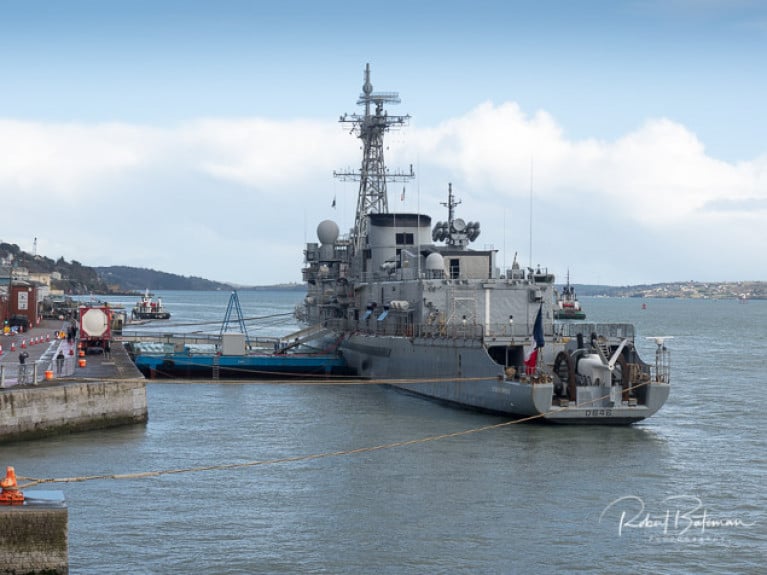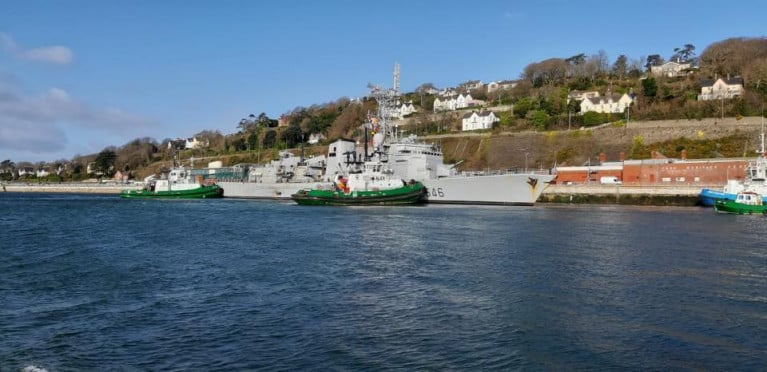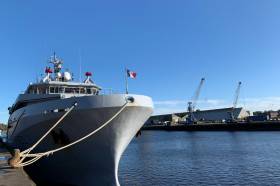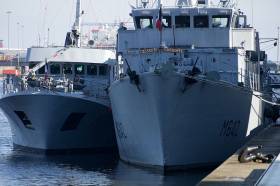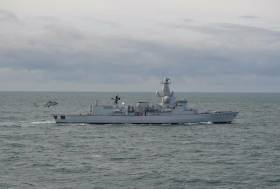Displaying items by tag: French Navy
A French Navy vessel is making its second visit to an Irish port within weeks as a 'Loire' class specialist support ship has arrived into Dublin Port this morning, writes Jehan Ashmore.
As Afloat reported last month the Garonne (A605) the fouth and final unit of a quartet of the 'Loire' class which called to Cork City Quays.
The class also known as metropolitan offshore support and assistance vessel (bâtiments de soutien et d’assistance métropolitains) or BSAM.
On this current call, Garonne is berthed at the North Wall Quay Extension, next to the Tom Clarke (East-Link) Toll-lift Bridge.
Among the roles Garonne is to support diving operations, deal with pollution in the aftermath of a spillage at sea. In addition to assisting submarines and surface ships, including salvage operations.
The Loire class is based upon civilian design, that been of a Multi Purpose-Supply Vessel (MPV) with a typical large open aft-stern deck for supplies and space for towing duties.
The custom-built BSAM quartet consist of the leadship Loire (A602), Rhône (A603), Seine (A604) and culminating with Garonne which was completed in 2020 by the Kership shipyard.
The 2,960 tonnes auxiliary MPV has a crew of 17 to operate the 70m long ship.
Last month's call to Cork by the Garonne had involved the vessel depart from Brest, Brittany whereas this call of the naval visitor had departed Cherbourg in neighbouring Normandy.
Garonne is to remain in port until Thursday morning.
As part of these port of calls, it is understood the vessel later this month is to make a call to the UK at the Royal Navy's main base in Portsmouth.
French Navy Support Ship Calls to Cork City Quays While Ambassador Visits Naval Base
Cork City Quays is where a French Navy ship is berthed having arrived from a naval base in Brest, Brittany to the Munster city for an extended weekend port of call, writes Jehan Ashmore
After a voyage of two days in the Celtic Sea, the FNS Garonne (A605) arrived to Cork Harbour on Friday morning.
The foreign naval ship passed the Irish Naval Service Naval Base in Haubowline in lower Cork Harbour when en-route to the city via Lough Mahon.
In 2020 the FS Garonne became the final unit of a quartet of custom-built 'Loire' class specialist offshore support and assistance ships to enter commission and serve the requirements of the French Navy.
The ship was ordered in 2016 to the Kership shipyard and is based on the design of a civilian class Multi Purpose-Supply Vessel (MPV) with the standard large aft-stern deck for supplies and towing duties.
Among the roles is support diving operations and dealing with pollution in the aftermath of a spillage at sea. In addition to assisting submarines and surface ships, including salvage operations.
On the same day of the 70m auxiliary vessel's arrival at North Custom House Quay, the Ambassador of France to Ireland, Vincent Guerend made a visit to the Naval Base.
The ambassador was received by the honour guard and was briefed by Commodore Malone about the Naval Service. In addition the role of both neighbouring nations on the Atlantic arc of north-west Europe where co-operation of maritime operations is key.
In addition the ambassador was welcomed on board L.É. George Bernard Shaw (P64) the newest of the quartet of Offshore Patrol Vessels (OPV)/P60 class which entered service in 2018.
FNS Garonne is to remain in port overnight and where on the adjacent quay to the south, is Cork City Marina which is conveniently located close to facilities and tourist attractions.
Likewise, the city is where the 17 personnel have had crew rest and recreation before the naval visitor is scheduled to depart tomorrow morning.
Planned French military exercises near Irish waters have been halted, the Foreign Affairs Minister has confirmed.
But as TheJournal.ie reports, Simon Coveney stopped short of declaring the drills cancelled outright or merely postponed, telling the Dáil today (Thursday 23 June) “that’s a matter for France”.
West Cork fishers and marine conservationists had raised concerns over the scheduled live-fire manoeuvres, which had originally been planned within the waters of Ireland’s EEZ this week.
The Irish South and West Fish Producers Organisation welcomed a subsequent relocation of the French naval exercises.
However, the Irish Whale and Dolphin Group warned that marine wildlife in Ireland’s waters would remain vulnerable to the impact of detonating missiles at sea.
TheJournal.ie has more on the story HERE.
French military exercises near Irish waters which began yesterday (Tuesday 21 June) could have a significant impact on marine wildlife, says a marine group that’s called for a halt to the manoeuvres.
The exercises, which are taking place over a number of days this week, have already been relocated out of Ireland’s EEZ, as the Irish Examiner reports — though the French Embassy said in a statement that “a small piece of the southern extremity of Ireland’s EEZ” may be affected.
After voicing their concerns over the planned live-fire drills off Ireland’s Southwest Coast, West Cork fishers welcomed the changes.
Patrick Murphy, chief executive of the Irish South and West Fish Producers Organisation — which is leading calls for a moratorium on military drills within the EEZ — said: “We don’t agree with these exercises but this was the best scenario we could have reached and we did it within 24 hours.”
However, as TheJournal.ie reports, the Irish Whale and Dolphin Group (IWDG) has warned that marine wildlife in Ireland’s waters remains vulnerable to the impact of detonating missiles at sea, which may “cause a large sound wave which can esonify a wide area with a massive acoustic shock wave”.
TheJournal.ie has more on the story HERE.
Irish vessels and crew have been warned over safety risks associated with a French military exercise off the South West Coast next week.
Marine Notice No 38 of 2022 from the Department of Transport gives details of the planned rocket-firing exercise in part of Ireland’s Exclusive Economic Zone (EEZ), which is currently scheduled for Thursday 23 to Saturday 25 June but may be postponed until a further date before Thursday 7 July.
“Given the nature of the planned exercises, vessels and crew are advised of safety risks in the operational area,” the notice adds.
Earlier this year, Russia sparked controversy when it announced plans for a similar firing exercise within the Irish EEZ. Those exercises were relocated after the Irish fishing industry voiced its concerns to the Russian ambassador, as previously reported on Afloat.ie.
Further details of this exercise, including coordinates, can be found in the Marine Notice attached below.
French Naval Frigate Latouche-Tréville In Cork Harbour
The visiting French Naval Frigate Latouche-Tréville was alongside in Cork Harbour at the weekend moored at the Cruise Liner berth in Cobh.
As Afloat previously reported, the frigate and her crew of 244 were in the south coast port in aid of the 'Denim Day 4 Dementia' which took place at the Naval Service base on Haulbowline Island.
The ship is one trio of F70 A SM type anti-submarine destroyers, which the French Navy instead classify as a frigate.
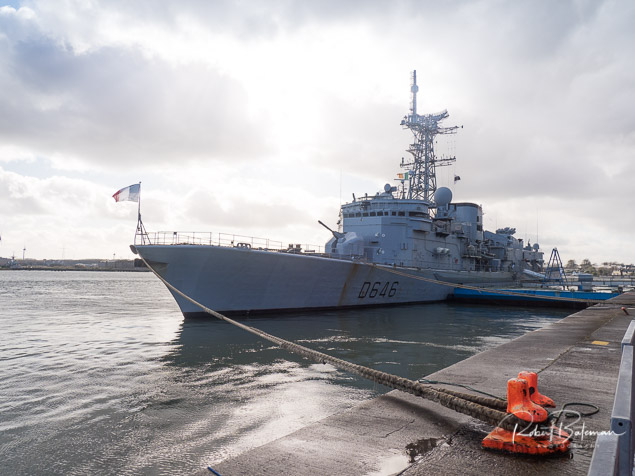 French Naval Frigate Latouche-Tréville alongside in Cobh Photo: Bob Bateman
French Naval Frigate Latouche-Tréville alongside in Cobh Photo: Bob Bateman
Equipped with Excocet surface to air missiles, the frigate commissioned in 1990 has a helideck and hanger that can handle two Lynx helicopters.
In the summer of 2009, she was filmed in stormy seas as part of the documentary Oceans. See vid below.
Female crew from a French Navy (Marine Nationale) frigate visiting Cobh, Cork Harbour joined the Naval Service Women’s Network as guests for a charity event, writes Jehan Ashmore.
The event to in aid of the 'Denim Day 4 Dementia' took place at the Naval Service base on Haulbowline Island opposite of where the frigate FASM Latouche-Tréville was berthed at Cobh's Deepwater Quay.
The charity gathering took place in advance of tomorrow's International Women's Day 2020.
FASM Latouche-Tréville is one trio of F70 A SM type anti-submarine destroyers, which the French Navy instead classify as a frigate.
Equipped with Excocet surface to air missiles, the frigate commissioned in 1990 has a heli-deck and hanger that can handle two Lynx helicopters.
The frigate has a crew total of 244.
Visitor Returns to Ireland As New French Naval Vessel Calls to Cork City
To those in Cork City this weekend and travelling down J.J. Horgan's Quay may have noticed a sleek new naval arrival making its way upriver to the quay.
According to CorkBeo, the shiny arrival is a new French Naval ship, Rhône. It was only launched this year, so get down to see this while you can!
The newbuild is a support vessel of the French Navy which entered service this year and as Afloat reported in the summer Rhône made a first visit to Ireland. On that occasion it was to the Port of Waterford.
For more on this current call to Cork, click here, before the naval visitor departs the city on Monday morning.
Flotilla of Five French Navy Vessels On Visit
#NavalVisits - A flotilla of five French Navy vessels are currently on a call to the capital following the small ships arrival into Dublin Port yesterday morning, writes Jehan Ashmore.
Mine counter measures (MCM) vessel Cassiopée built in 1984 is of the Éridan-class. The class otherwise commonly known as the 'Tripartite' class, berthed downriver unlike the rest of the flotilla allocated along Sir John Rogerson Quay.
Accompanying the MCM Tripartite vessel displacing 615 tonnes are three sonar-towing training ships of the (BRS) type Antarès, the namesake of the leadship class which is in port. The remaining pair are Aldebaran and Altaïr. Each of the trio displace just 340 tonnes and were all commissioned in the 1990's.
The fifth visitor is represented by the Chamois class auxiliary Élan which among its duties serves as an anti-pollution vessel based in Cherbourg. The 400 displacement tonnes vessel with a large aft-deck is equipped with a hydraulic crane located at the stern. The veteran vessel in April, marked its 40th year since entering service in 1978.
An even older French Navy visitor was the Paimpolaise-class sail training ship Belle-Poule. The schooner dating to 1932 made an impressive sight during last Monday's Bank Holiday 'Parade of Sail' in Dublin Bay before heading for Bordeaux.
Trio of European Neighbouring Nation's Navies to Visit Dublin Port Over May Bank Holiday
#NavalVisits - Navies from neighbouring nations of France, Belgium and the Netherlands are to arrive in Dublin Port today in advance of the May Bank Holiday Weekend, with one ship from each navy visiting, writes Jehan Ashmore.
First to arrive is the French Navy's Éridan class minehunter Andromède (M 643) one of the 'Tripartite' vessels completed in collaboration of the three visiting navies to the Irish capital.
Already in the port to welcome the trio of European naval visitors is the Naval Service's OPV90 class L.E. William Butler Yeats (see story). The second of three 'Beckett' class sisters in service, arrived on Tueday and is berthed at Sir John Rogerson's Quay.
While across Dublin Bay, is where yesterday CPV L.E. Ciara docked in Dun Loaghaire Harbour where an unusual caller the ro-ro Stena Carrier underwent a survey. Some of the '4Runner' class sisters down the years have been chartered to the UK's Royal Fleet Auxiliary and NATO.
Returning to Dublin Port is where Andromède is to berth at Sir John Rogersons Quay closer to the centre of the capital. It was in the French capital yesterday where Minister for Agriculture Food & Marine, Michael Creed TD met his French counterpart, Stephane Travert.
Afloat adds during the French naval visit, the Association of Veterans of the Foreign Legion in Ireland meets for the annual commemoration of the Battle of Camarón. The ceremony this year will take place on the Bank Holiday Monday, 5 May at 11:45 am at Collins Barracks. This free event is open to all to attend at the venue close to the banks of the Liffey.
As for this morning, the Dutch Navy's HNMLS Evertsen (F805) is to make an appearance albeit docking at a deeper quay downriver. The vessel is the fourth De Zeven Provinciën-class frigate of the Royal Netherlands Navy.
The third visitor, the Belgian Navy's BNS Louise-Marine (F931) will arrive in the afternoon and is to berth next to Andromède. The final caller to the capital is the second of a pair of Karel Doorman-class frigates of the Belgian Maritime Component (the official name of the navy). The frigate commissioned in 2008 was acquired three years previously from the Netherlands Navy.


























